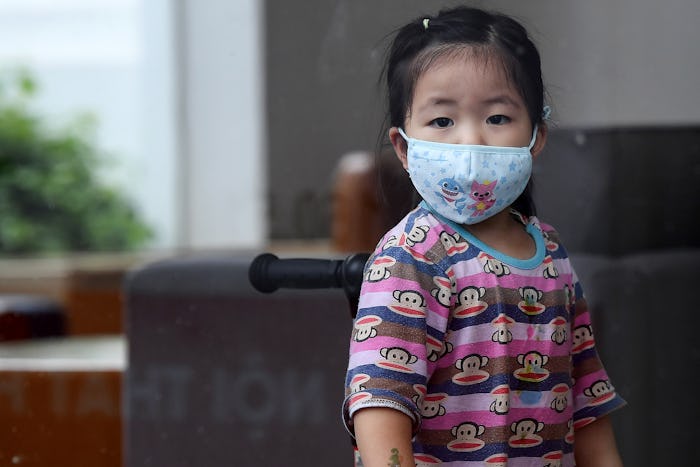Life

What Are The Symptoms Of Coronavirus In Kids? Here's What You Should Know
Coronavirus is a global news event, but how will you recognize it in your own corner of the world? It's important to know what the symptoms of coronavirus in children look like, and how you should react to any signs of the illness in your own child. The good news is that most kids do not appear to be in much danger from the virus at this time.
For the most part, children may present mild symptoms of the coronavirus. "Based on very limited data, the symptoms of COVID-19 in children seem to be generally mild: runny nose, cough, and fever," Dr. Rishi Desai, Chief Medical Officer of Osmosis and a former Epidemic Intelligence Service Officer in the Division of Viral Diseases at the CDC, tells Romper. Basically, a child with coronavirus may appear to have a bad cold. "The main symptoms are the same symptoms we get from a cold or the flu: fever, runny nose, and cough. Vomiting and diarrhea have also been reported," Dr. Erica Waterman, a pediatrician at Cohen Children’s Northwell Health-GoHealth Pediatric Urgent Care, tells Romper. It could be difficult to tell coronavirus symptoms apart from those of a cold, flu, or even seasonal allergies.
So what should you do if your child has a runny nose, cough, or other potential coronavirus symptoms? "Do not panic. If your child has symptoms of a respiratory virus, chances are it’s one of the many common viruses circulating in the community, but even if it is COVID-19, your child is likely to be just fine," Dr. Shira Doron, Infectious Disease Physician and Hospital Epidemiologist at Tufts Medical Center, tells Romper. Making sure your child has plenty of rest and fluid is key, and it's smart to keep your kid out of school for the time being, as Dr. Doron further explains. Also, see how teachers are preparing for coronavirus in your kid's school, so you know their policies about the virus.
For the most part, experts stress that the coronavirus does not seem to pose a high risk for children. "Relatively speaking, a very small proportion of the infected patients throughout the world have been children. Their symptoms are similar (fever, cough, sore throat, stuffy nose, sneezing) but their disease tends to be quite mild, whereas a larger proportion of adults have severe disease," says Dr. Doron. In general, the virus seems to affect kids less severely. "While there are some reports of this new disease in children, most of the identified cases are in adults. This may be because children are having milder disease, so they are not being taken to the hospital and not getting tested," says Dr. Waterman. For the most part, although children can get coronavirus, it does not appear to present a major threat to most children at this time. If you have any specific concerns about your child's health concerns and the virus, discuss them with your pediatrician.
That said, there are some symptoms that do call for immediate medical attention. "The most important thing is to watch your children for any signs of lower respiratory infection, such as frequent cough, a cough that sounds deep or congested, rapid or labored breathing, chest pain, pale or blue color of the lips, as well as signs of dehydration, weakness or lethargy. A child with any of these symptoms should be seen by a doctor and may require hospitalization," says Dr. Waterman. Age is also a factor. "All children under 3 months of age with a fever should be seen by a doctor," says Dr. Doron. If your child presents any of these concerning symptoms, then contact a medical professional right away.
With all this in mind, it's totally understandable if you still have a lot of parental anxiety about coronavirus, because of course you just want to keep your loved ones safe and healthy at this time. Although the experts are still learning more about coronavirus every day, remember that it does not appear to be a significant threat to the majority of children at this time. Definitely keep an eye on your kid for signs of illness, but remember that your little one will most likely get through the coronavirus outbreak without an issue.
If you think you’re showing symptoms of coronavirus, which include fever, shortness of breath, and cough, call your doctor before going to get tested. If you’re anxious about the virus’s spread in your community, visit the CDC for up-to-date information and resources, or seek out mental health support. You can find all of Romper’s parents + coronavirus coverage here, and Bustle’s constantly updated, general “what to know about coronavirus” here.
Experts:
Dr. Rishi Desai, Chief Medical Officer of Osmosis and a former Epidemic Intelligence Service Officer in the Division of Viral Diseases at the CDC.
Dr. Shira Doron, Infectious Disease Physician and Hospital Epidemiologist at Tufts Medical Center
Dr. Erica Waterman, a pediatrician at Cohen Children’s Northwell Health-GoHealth Pediatric Urgent Care
This article was originally published on